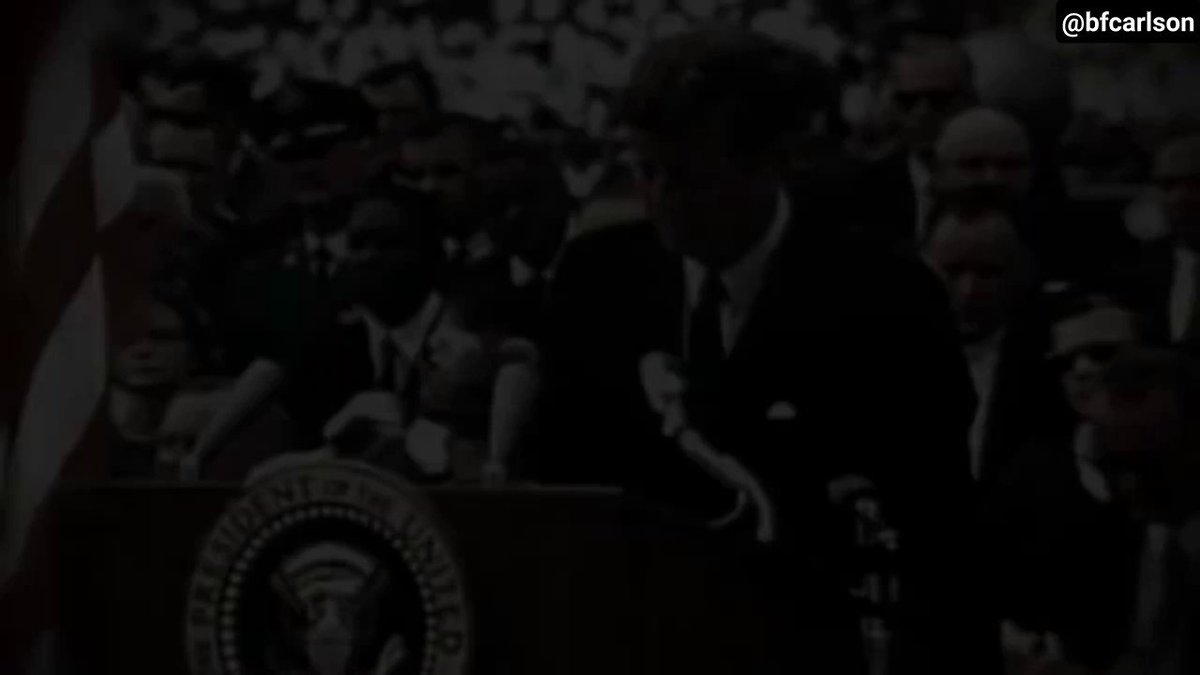What JFK has to teach about persuasion
|
In 1962, a man stood on a football field in Texas. The autumn heat slicked his face with sweat. 35,000 people sat in stands around him. Watching. Listening. Decades before PowerPoint, TED talks, focus groups, quick-response surveys, and real-time message testing, he gave a long, 18-minute speech in a thick New England accent. He spoke about science. He evoked man’s technological progress, drawing an arc of history spanning 50,000 years. And then he pointed to where Americans must go next: the Moon. The Lesson61 years later, it gives me chills. What can we learn from it? Why does listening to President John F. Kennedy — regardless of your country or politics—sound so different from leaders of today?
I have written speeches for major events. This is a beautifully crafted one. Here's what it teachesFirst, why this is important: All of us who live mostly online are engaged in daily persuasion. You use words to convince friends. Colleagues. Even critics. And you are constantly being bombarded with efforts to persuade. Many assume their natural (casual) communication style works in any medium. Generally, it doesn’t. What looks "normal" on any given medium — TV news, Twitter, a podcast — looks odd up close. To translate to a large audience, complex information must be compressed and amplified. This is why people on screen wear makeup.
On TV, you amp up your energy. On podcasts, you modulate your voice. In writing, you cut. So: why does JFK’s speech work? (Watch the whole speech or read the full transcript here and let me know what you think.)
Of course, JFK's magnetism is palpable. But remember: He was a sickly man. What we're seeing here is not merely a gift. It's a virtuoso playing upon the instrument of himself. What I'm EnjoyingFinally read The Whig Interpretation of History by Herbert Butterfield. A classic on how we err by reading our present biases into the past. It's excellent. Bonus: This thread has good advice on how to spot bad news on a balance sheet as an investor.
What I'm Working OnLast week, the executives I am coaching went through Module 4 of the Executive Media Mastery program. We talked about how to get the attention of media in your niche — ethically and authentically. There’s more demand than ever for voices with expertise and authority. It’s just a matter of knowing how to package and position yourself to be found. Once this round is finished, I’m excited to get started with the next cohort. I'm grateful to see lots of interest so far. If haven't indicated interest yet and want to be the waitlist, please let me know now. Question of the WeekWhat's the most impressive speech you've ever heard? Reply with any thoughts, questions, corrections, or just to say hello. Thanks. Until the next time, Ben PS - Have a friend who might be interested in this newsletter? Please forward it along. I'm grateful for everyone who subscribes. Other ways to work with meOn a selective basis, I have helped executives, entrepreneurs, and professionals to find the most powerful way to tell their stories. Whether it's a podcast appearance, TED talk, or published article leading to a book, I have experience helping others. If you have a need, reply to this email and we can discuss the application process. |
Benjamin Carlson
I'm a communications exec and a former editor at The Atlantic and foreign correspondent. Subscribe for lessons from my 15 years in media and PR
Thought Leadership Lessons from the Greatest Logo Designer of All Time Over the last two years, I’ve traveled through a succession of university archives—aesthetically gorgeous and teeming with deep insights—where I studied the papers of twentieth century visionaries, innovators, and creators. One of them was Paul Rand (1914-1996), a giant of twentieth century graphic design, whose papers are housed at Yale University. Rand was the preeminent logo designer of his day. He created the iconic...
Content Lab: How to Be Positioned Right in 2025 This Jaguar ad is an accidental masterclass in what's changing in the culture and where it's going, right beneath our feet. What might have seemed provocative a year ago now feels utterly tone deaf. What was intended to appear bold, futuristic, and enlightened instead seems flat, cowardly, and anti-human. Consider for a moment. It has no human voices. No smiles. No emotions. No sense of place or time. No melodies. No cities. No food. No roads....
The Carlson Letter Castor and Pollution, Max Ernst, 1923 Do you like your online self? Do you know your online self? Whether you like it or not, one of the first things a new acquaintance will do is Google you. What do they see? If you’re like many of us, they may see a series of results offering to sell your address, phone number, and possible family affiliations. Then they may see a Facebook page (yours, or maybe a namesake’s), your old work headshot, your LinkedIn profile. If you have a...


